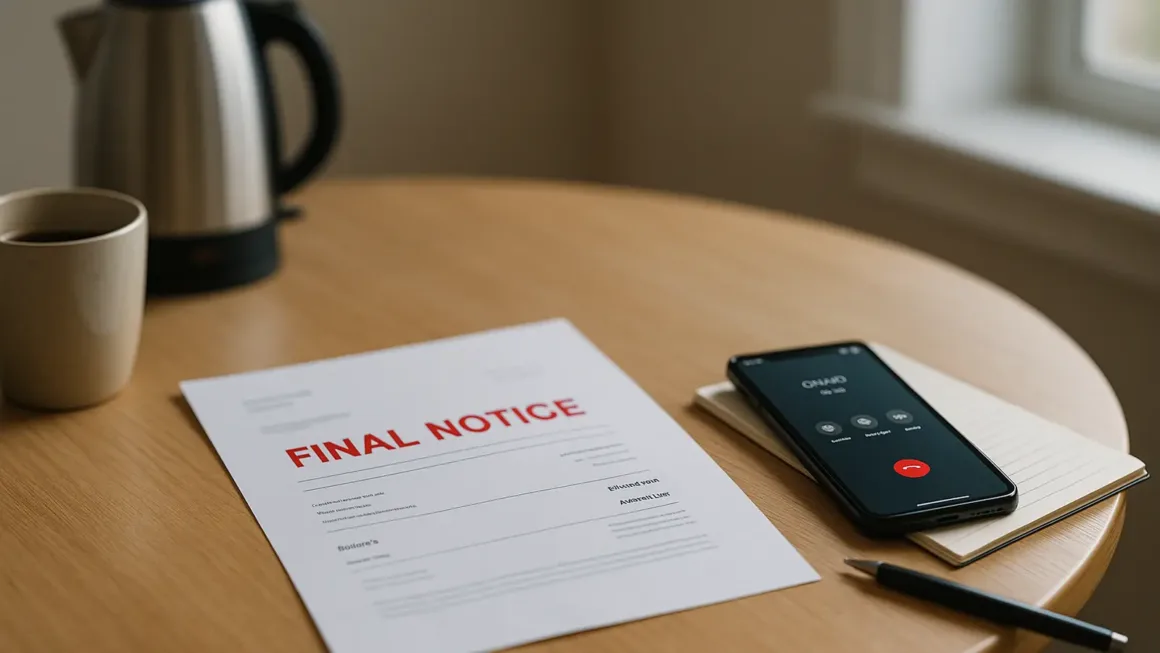Table of Contents Show
When money is tight, days stretch and nights shrink. The fridge dies the night before payday, the rent reminder lands with a thud, the gas supplier’s final notice stares back from the doormat. This guide is for those week-four moments—what to do in the first hour, your legal rights, where to get free help, and when borrowing might be appropriate as a last resort. If you’re overwhelmed, contact free debt-advice services such as Citizens Advice or StepChange, and try these simple money fixes to stabilise the week ahead.
How to use this guide
- Skim the scenario that matches your crisis.
- Use the phone script in that section to ask for help.
- Check free routes like council support, supplier schemes, and legal protections.
- If there’s still a gap, see Before you borrow (last resort only) before you consider credit.
1) The car fails, and you need it for work
First steps today
- Get two quotes and ask the garage about staged payments.
- Check emergency help through your council’s Household Support Fund—start at GOV.UK and follow through to your local page.
- If you receive Universal Credit, ask about a Budgeting Advance for essential one-off costs. Use the Citizens Advice link above for practical steps.
Phone script for the garage: “Hi, I need the car to keep working. Could we agree on a staged payment plan of £X per week and prioritise safety-critical work first?”
2) You’re short on rent this month
Speed, honesty, and a plan matter most.
- Talk to your landlord early and propose an amount you can afford. Read Citizens Advice (linked above) for repayment plans, deductions from benefits, and what to do if things escalate. For strategies that can prevent losing your home, see alternatives to eviction.
- If you receive Housing Benefit or the housing element of Universal Credit, ask your council about a Discretionary Housing Payment linked from that page.
- If the shortfall is an emergency, a Budgeting Advance may plug the gap.
Phone script for the landlord or agent: “I’m short this month due to X. I can pay £___ today and the balance across the next ___ weeks. Can we confirm a written repayment plan?”
3) A final warning on your gas or electricity bill
Energy is a priority bill, so act now.
- Tell your supplier you want an affordable repayment plan and support under their policies. Read Ofgem’s guidance on prepayment protections for what must happen before any switch or forced installation.
- If you still can’t pay, ask your council about the Household Support Fund (see the GOV.UK link above) for emergency help with essentials.
Phone script for the energy supplier: “I’m struggling and need a plan I can afford. I’m asking for forbearance and an affordable repayment plan under your support policies.”
4) An unexpected vet bill
No one wants to choose between a pet and a bill.
- Use the PDSA eligibility checker to see if you qualify for free or low-cost treatment in your area.
- If you’re not eligible, ask your vet to prioritise essential treatment and set staged payments. For longer-term cost control, read pet desexing: why and when.
Phone script for the vet: “I’m in hardship. Can we prioritise pain relief and essential treatment today and set staged payments for follow-ups?”
5) Sudden travel you can’t put off
- For rail, try split-ticketing and off-peak options and book online where possible.
- Check whether your council’s Household Support Fund can help with essential travel using the GOV.UK link above.
- If you receive Universal Credit and travel is essential for work or job-seeking, ask your work coach about short-term help or a Budgeting Advance.
Phone script for your employer: “I have an urgent family matter. Could we agree on a temporary advance or a short-term shift change while I sort this?”
6) The fridge or cooker breaks, and food is spoiling
- Ask your council about help through the Household Support Fund using the GOV.UK link above.
- If you receive Universal Credit, you may be eligible for a Budgeting Advance to cover essential appliances.
- Keep receipts and register the warranty. Photograph the failed unit if you’re applying for support.
Your rights on water bills
If you are behind on water bills, domestic water cannot be disconnected for non-payment in England and Wales. Read Ofwat’s Paying Fair guidelines and the page on supporting customers in debt from the same section. Water firms should help you agree a fair plan and must not threaten disconnection for a domestic home.
Before you borrow (last resort only)
Start with free help first. Use the links above to:
- Get Breathing Space to pause most creditor action via GOV.UK,
- Check Discretionary Housing Payments and your council’s Household Support Fund,
- Speak to Citizens Advice or StepChange for a realistic plan,
- Ask energy and water suppliers for an affordable repayment plan under their support policies.
Safer alternatives before any high-cost credit
- A small loan from a credit union can be cheaper and more flexible than payday or short-term credit.
- If you receive Universal Credit, ask about a Budgeting Advance for essential, one-off costs.
- Explore employer options such as a one-off payroll advance or temporarily adjusted shifts.
- For bigger-ticket planning once things stabilise, here’s how to finance a remodel without equity.
If you still have a short-term gap
Borrowing should be the final step. If you must borrow:
- Do an affordability test: can you repay without cutting rent, energy, food, council tax, or travel to work? If not, don’t take the loan.
- Have a clear end date and avoid rolling balances.
- Read the rules first: the FCA price cap rules and MoneyHelper’s payday-loan explainer outline maximum costs, late-fee limits, and your rights.
- Compare total cost, not just the rate—include fees and possible late charges.
- If eligible for social-purpose workplace credit, one option sometimes discussed is a same day loan. Treat any credit with caution and only after exhausting free support.
Disclosure: We emphasise free assistance as the priority. Links in this guide point to official or neutral sources and should not be taken as personal financial advice.
Build a small emergency buffer
When you are back on your feet, aim for a small emergency fund. Even ten to twenty pounds a week builds breathing room. Automate contributions on payday and keep the money in a separate, easy-access pot. Review energy use, insurance excesses, and subscriptions each quarter so you are not paying for what you do not use.
FAQs
What should I tell my landlord if I can’t pay this month?
Explain the cause, offer a specific amount you can pay now, propose a weekly plan for the rest, and ask for a written agreement. Start with Citizens Advice at the link provided above.
Can my supplier force me onto a prepayment meter?
There are strict rules and extra protections for vulnerable households. Ask for an affordable plan and support before any switch—see the Ofgem link above.
Will my water be cut off if I’m in arrears?
No. Domestic water disconnections for non-payment are not allowed in England and Wales. See the Ofwat link above.
What is Breathing Space?
A government scheme that gives you legal protection from most creditor action while you get debt advice—start at the GOV.UK link above.
How do I apply for a Budgeting Advance?
If you receive Universal Credit and meet the criteria, apply by phone or via your online account. Use the Citizens Advice link above for steps and numbers.









